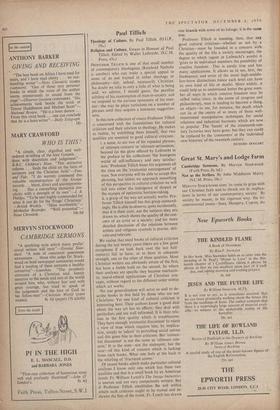Great St. Mary's and Lodge Farm
Not as the Scribes. By John Middleton Murry. (S.C.M. Press, I8s.) MERVYN S1OCKWOOD aims 'to come to grips with our Christian faith and to thrash out its implica- tions in terms of our contemporary society.' By society he means; in his vigorous way, the bi' controversial issues—Suez, Hungary, Cyprus, the bomb, the Wolfenden Report. He is not strictly a critic of society, and can be pretty complacent about it.: he finds, for instance, that as a nation 'we pride ourselves, with some justification, that We abominate anything that smacks of apartheid and colour bars.' When he comes upon some thoroughgoing social criticism from John Osborne or Lindsay. Anderson, he can do little but record his disagreement; he offers them Christianity as an alternative, but the predicament they describe is outside his experience. He is a good controver- sialist rather than a radical critic. The big issues draw him out, he enjoys coming to grips with the newspapers and the politicians, and his views, of course, are more liberal and enlightened, his language more realistic, than is usual in church. This has helped to make them famous; at any rate their fame may not be entirely due to their merits. Reading his Cambridge sermons, however, one finds the:edge of controversy oddly blunted by the mere fact that they were delivered in an academic community. They take on a little of the atmosphere of intellectual privilege, where an enlightened idea is not scandalous or out of place.
Middleton Murry was speaking to a different kind of congregation at Lodge Farm. His lay ser- mons descend at times to nagging and chivvying; this farming community was his spiritual family, but a family at its most ambiguous, and the tensions among them like those of a high-altitude Camp. But this was its value : it was a fresh, fumbling start to the problem of living together in society. Murry was not concerned with con- temporary society as Dr. Stockwood sees it, and least of all with correcting particular abuses. He saw himself as creating a new form of human society in place of one that had perished. He called it a free society, where 'the members can See plainly that they are totally dependent on one another,' and the special problem that absorbed him was the exercise of moral responsibility in these conditions.
Like all radical reformers he goes back to original sources, and his chief concern as a religious thinker is for the authentic doctrine of Christ; the rest he distrusts as 'the inevitable result of diluting Christianity in order to make it a universal religion.' After Christ, it is the early Christian communities that interest him; he sees the affinity with his own experiment. He was a deeply religious man, so far from orthodox that he regarded Christianity as an invention by Christ. His social thought was scarcely more conven- tional, but a good many virtues of the first com- munities are still alive in these sermons.
ROBERT TAUBMAN















































 Previous page
Previous page